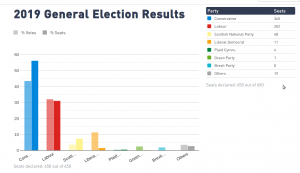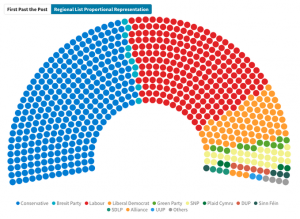The media has trumpted a “landslide” victory for the Tories in the 2019 UK election, but this ignores the fact that more people voted against the Tories than for them: the total percentage of votes for Tory candidates was 43.6% – indeed a significant amount, but not really a “landslide”. The outdated and undemocratic first-past-the-post (FPTP) voting system has rewarded the Tories with a far greater share of seats in parliament than is truly representative of the public vote. According to analysis by the Electoral Reform Society, 45.3% of voters are not represented – that is, they did not vote for the MP who is representing their electorate in parliament. That’s slightly more than the percentage who actually voted for this supposed “landslide”.

The FPTP system is invariably a battle between two major parties where the winner takes all: those who vote for a minor party or even the losing major party are not represented at all in government, and it’s very difficult for minor parties to gain seats in parliament. The system encourages the idea that voting for a minor party is a wasted vote. The winner is sure to be one of the larger parties, and the need for a coalition is unlikely. When New Zealand switched to an MMP (mixed-member-proportional) system in 1996, we began to have coalition governments – not always “successful”, but overall leading to many more previously unrepresented voices and perspectives being included in debate and policy-making. We also immediately saw a dramatic increase in support for smaller parties and more diverse representation within the House, including more Maori, Pacific and other ethnicities, more women, and the world’s first transgender MP.

If the UK had an MMP system, Thursday’s election would have given the Tories 283 seats (43.6%) and Labour 209 (32.2%). The Liberal Democrats would have 75 seats – significantly more than the 11 they have won under FPTP. A coalition between Labour and the Liberal Democrats would have placed them one seat ahead of the Tories, and adding the Greens and/or the SNP would have made a left coalition government a real possibility.
As it is, the Tories 43.6% of votes has delivered them 56.2% of the seats (365) in the House of Representatives – still not exactly a landslide, but certainly more than enough for them to be able to govern as they please. Johnson’s pledge to never ignore the opinions of remainers is about as meaningful as his (in)famous desire to be “dead in a ditch” if he didn’t bring the UK out of the EU by the 31st October …
The “losers” of Thursday’s election need to stop the blaming and finger-pointing, and start demanding urgent and immediate electoral reform.